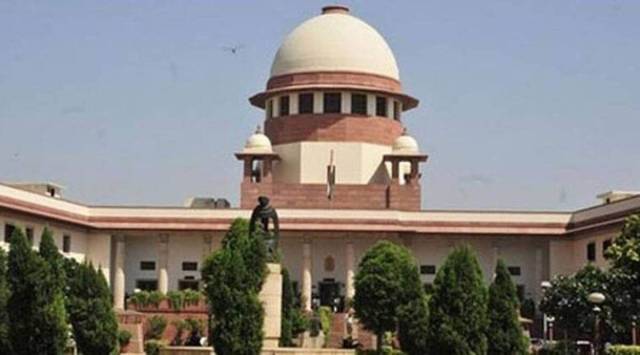Stay updated with the latest - Click here to follow us on Instagram
The election commission and judicial scrutiny
Of late, public institutions have received much attention, as there has been much concern about their well-being. The Supreme Court’s recent judgment, which goes beyond the appointment procedure of the Chief Election Commissioner (CEC) and the Election Commissioners (ECs), reflects such concern.
 Supreme Court of India (File)
Supreme Court of India (File) Written by Ashutosh Kumar
Of late, public institutions have received much attention, as there has been much concern about their well-being. The Supreme Court’s recent judgment, which goes beyond the appointment procedure of the Chief Election Commissioner (CEC) and the Election Commissioners (ECs), reflects such concern. The ongoing discussion on the judgment has remained narrow and overly legalistic, focusing on the institution’s constitutional-legal framework and judicial interpretations related to its status and powers.
Reading the Constitutional Text
Article 324 of the Indian Constitution created the ECI, a permanent constitutional institution. Clause 1 of the Article vests it with the task of ‘superintendence, direction, and control of the preparation of the electoral rolls for, and the conduct of, all elections to Parliament and to the Legislature of every state and elections to the office of President and Vice President.’ Clause 2 mandates that the appointment of the CEC and ECs ‘shall, subject to the provisions of any law made in that behalf by Parliament, be made by the President.’
In order to ensure the independence and status of the ECI and its members, Clause 5 mandates that the CEC ‘shall not be removed from his office except in like manner and on the like grounds as a judge of the Court, and the conditions of service’ of the CEC ‘shall not be varied to his disadvantage after his appointment.’ In its attempt to expand its authority, the ECI that came into existence on 25 January 1950 has been helped by the ‘broad nature of its constitutional framework,’ which gives it not only a ‘solid underpinning’ but also allows for flexibility in interpreting and enforcing its mandate effectively as circumstances change and new challenges arise. The Court has played an enabling role through several of its landmark judgments (Sondhi 2016).
The Petitions
The most recent judgment of the five-member Constitution bench headed by Justice KM Joseph has come on a clutch of petitions filed in public interest by Anup Baranwal in 2015, followed by Association for Democratic Reforms in May 2021. The gist of the petitions was that due to the failure of the Parliament to enact legislation regarding the mode of appointment and qualifications of the CEC and ECs, successive union governments have appointed people of their own choice, thereby raising questions about the neutrality and independence of the EC and its members. The court was pleaded to step in to fill ‘the constitutional vacuum’ due to the legislative ‘inertia’ and provide for an independent body to appoint the CEC and ECs to ensure the neutrality of the EC, isolating its functioning from any political interference and executive control.
The petitions also referred to what it perceived as a lacuna in the procedure of the removal of ECs as stipulated in Clause 5 of Article 324. Unlike the CEC who has to be impeached by the two-third majority of the Parliament on the proven charges of ‘proved misbehaviour’ or ‘incapacity’ like in the case of the Supreme Court judge, the President can remove ECs simply on the recommendation of the CEC, though the recommendation is not binding on the President.
The judgment
The Constitution Bench delivered a unanimous judgment that a committee, consisting of the Prime Minister, the leader of the opposition or the leader of the largest party in the Lok Sabha, and the Chief Justice of India, shall recommend the names of the Chief Election Commissioner (CEC) and Election Commissioners (ECs) to the President for appointment. However, this recommendation will be subject to any future law passed by Parliament. The Court acknowledged the concerns of the members of the Constituent Assembly (CA) about the need to keep the EC independent of the executive, unlike the election management body provided under the Government of India Act, 1935, which conducted provincial elections in 1937 and 1946. The judgment did not agree with the petitioners’ plea that the ECs be accorded the same security of tenure as the CEC has under the constitution, but it reiterated that there is “equality otherwise between the CEC and ECs in various matters.”
In the TN Seshan case (1995), while upholding the manner of the removal of ECs, the Court had clarified that the CEC recommendation for removal must be based on “intelligible and cogent considerations, which would have relations to the efficient functioning of the Election Commission.” The Constitution Bench noted that this specific “privilege has been conferred on the CEC” so that the ECs “are not at the mercy of political or executive bosses of the day.” On funding issues, the judgment recommended that the union government should set up a permanent secretariat that would facilitate the EC to have its own set of officers and staff and not depend excessively on the officers and staff on deputation from different departments/ministries of the Union government. The Court also asked the government to bring legislation to the effect that the expenditure of the EC is charged upon the Consolidated Fund of India. As for the status of the right to vote, the Bench adjudged it as a constitutional right but refrained from making it a judicial declaration, as an earlier five-judge constitution bench had held the right to vote as a statutory right in the Kuldeep Nayar case (2006), which was a reiteration of another constitution bench judgment in the NP Ponnuswami case (1952). Justice Rastogi, however, in his separate but concurring judgment, observed that the citizens’ right to vote not only emanated from Article 326 but also from Articles 15, 17, 19, and 21 in Part III of the Constitution and therefore, by implication, could be considered a fundamental right.
Issues of Debate
The judgment regarding the setting up of a collegium has received wide acclaim on the following grounds. First, it shall fulfill a constitutional requirement as envisaged in Clause 2 of Article 324 and also desired by the CA members. Second, the broad-based selection of the CEC and the ECs shall enhance the “moral authority” and improve citizens’ perception about the neutrality and independence of the institution. Third, it would save the EC members from coming under the pressure from the party in power at the Centre, which may attempt so in its “insatiable quest to continue in the saddle.”
>> One can, however, have several reservations regarding the judgment. First, the CJI being in the committee to recommend the appointments raises the question of the violation of the doctrine of separation of power as the appointments fall in the domain of the executive. Second, since the CJI is going to be a member of the recommending committee, in case there is a case of impropriety that comes up against the ECI members in court, it would cause embarrassment to the office of the CJI. Third, the judgment, by holding the existing system as flawed and also making observations during the hearing stage that implicitly raised a question mark over the manner of appointments to the ECI, undermines the position and authority of the incumbent ECI members. Fourth, it is debatable whether the collegium system can make the ECI immune to political pressure, as the CBI is a pertinent example. Fifth, the judgment may incentivize the demand for the inclusion of the CJI in the selection process of other institutions like the Enforcement Directorate or UPSC, which could be seen as a case of ‘judicial overreach.’ Sixth, the court, by rejecting NJAC, refused to involve the role of an elected executive under the pretext of judicial independence, but in this case, it is going to be part of the selection process falling under the jurisdiction of the executive. Finally, amidst all the talks of democratic backsliding in Western forums and India, there has not been a serious question mark over the fairness of the election process in India, credit for which goes to the ECI.
(Ashutosh Kumar teaches in the Department of political science, Panjab University.)







